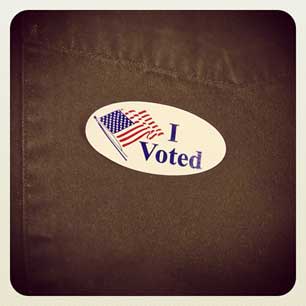Honest, paywall-free news is rare. Please support our boldly independent journalism with a donation of any size.
Before the election, the National Congress of American Indians (NCAI) had its eye on at least 11 states where voter ID laws threatened to keep Native voters from the polls. But a major organizing effort by the largest national organization of tribal governments, which partnered with Rock the Vote and other groups, realized a record turnout of Native voters, who registered at higher rates than any other ethnic group in New Mexico and Montana and played a key role in delivering victories for Democratic candidates in tight Senate races in North Dakota and Montana.
“We’re literally setting up voting as part of our tradition as Native people,” said Peggy Flanagan of the Minnesota advocacy group Wellstone at a November 8 meeting with advocates and reporters. Fifteen- to 19-year-olds represent a significant bubble in the US Native population, which has 9 percent more youth under age 18 than the general population. If turnout follows the trend set this year, 2014 and 2016 could see another jump in Native voters’ influence on the national political landscape.
NCAI’s director Jackie Johnson Pata said Minnesota’s most heavily Native American precincts more decisively rejected a state constitutional amendment that would have required photo ID to vote than did precincts with fewer Native voters, by margins as high as 88 percent compared to the 55 percent average.
“This voter ID amendment was a threat to our tribal sovereignty,” said Flanagan. Enrolled tribal members are dual citizens of their tribes and the United States, which is constitutionally obligated to ensure that Native citizens have access to participation and that their governments exist in parity with the federal government. A confusing mix of ID requirements in states like Florida, Oklahoma, South Dakota and elsewhere meant that even when tribal IDs were supposed to be recognized, specific requirements for photographs or expiration dates often rendered them invalid. Unlike a drivers license or other state-issued ID, tribal membership does not expire. The Cherokee Nation did not issue IDs with photos until very recently, and some other tribes still do not, according to Arvo Mikkanen of the Oklahoma Indian Bar Association.
Redistricting also struck a blow to Alaska Natives, whom Pata said “lost a couple of key state legislators” to the redrawn boundaries there.
“We cannot let that become a trend for us,” said Pata.
Pata shared a list of ambitious goals for the lame-duck session, including the passage of a version of the Violence Against Women Act (VAWA) that includes new protections for Native women on reservations, whose tribal governments have up to now lacked the power to detain or prosecute non-Native crime suspects. The expanded VAWA allows tribal authorities to prosecute non-Native people accused of domestic violence, dating violence or violation of a protection order. Eighty-six percent of perpetrators of sexual violence against Native women are non-Indian, according to the Bureau of Justice Statistics.
“I think the prospects are good” for the expanded VAWA, said Pata, “and I’m not just saying that because I have a positive Pollyanna viewpoint.” VAWA, which has been reauthorized twice with bipartisan support, has been blocked this year by the stalemate in Congress and the House GOP’s choice to invoke the same procedural rule it worked around to pass the transportation bill.
“I think this election had a lot to do with women’s issues,” said Pata. “Violence against women came up over and over again.”
“There’s some good momentum,” she said.
Pata was enthusiastic about President Obama’s mention of Native Americans in his acceptance speech, when he said, “It doesn’t matter whether you’re black or white or Hispanic or Asian or Native American or young or old or rich or poor, able, disabled, gay or straight, you can make it here in America if you’re willing to try.”
“That is a huge leap for Indian Country,” said Pata. “That means he’s making a commitment to this ongoing relationship.
But for many the president’s bootstrap optimism may be overshadowed by the first post-election task in Washington, where all eyes are now on the January 2, 2013, deadline that will trigger across-the-board spending cuts in the federal budget if an agreement to reduce the national debt by $1 trillion is not reached by then. An October 26, 2012, NCAI resolution urging Congress to avert the cuts projected that if a deal is not reached, Native Americans would be impacted in fiscal year 2013 by cuts of 35 percent to a home energy assistance program for tribes, 23 percent to Native American Job Training, and 21 percent to housing grants, among others.
A terrifying moment. We appeal for your support.
In the last weeks, we have witnessed an authoritarian assault on communities in Minnesota and across the nation.
The need for truthful, grassroots reporting is urgent at this cataclysmic historical moment. Yet, Trump-aligned billionaires and other allies have taken over many legacy media outlets — the culmination of a decades-long campaign to place control of the narrative into the hands of the political right.
We refuse to let Trump’s blatant propaganda machine go unchecked. Untethered to corporate ownership or advertisers, Truthout remains fearless in our reporting and our determination to use journalism as a tool for justice.
But we need your help just to fund our basic expenses. Over 80 percent of Truthout’s funding comes from small individual donations from our community of readers, and over a third of our total budget is supported by recurring monthly donors.
Truthout has launched a fundraiser to add 340 new monthly donors in the next 5 days. Whether you can make a small monthly donation or a larger one-time gift, Truthout only works with your support.
